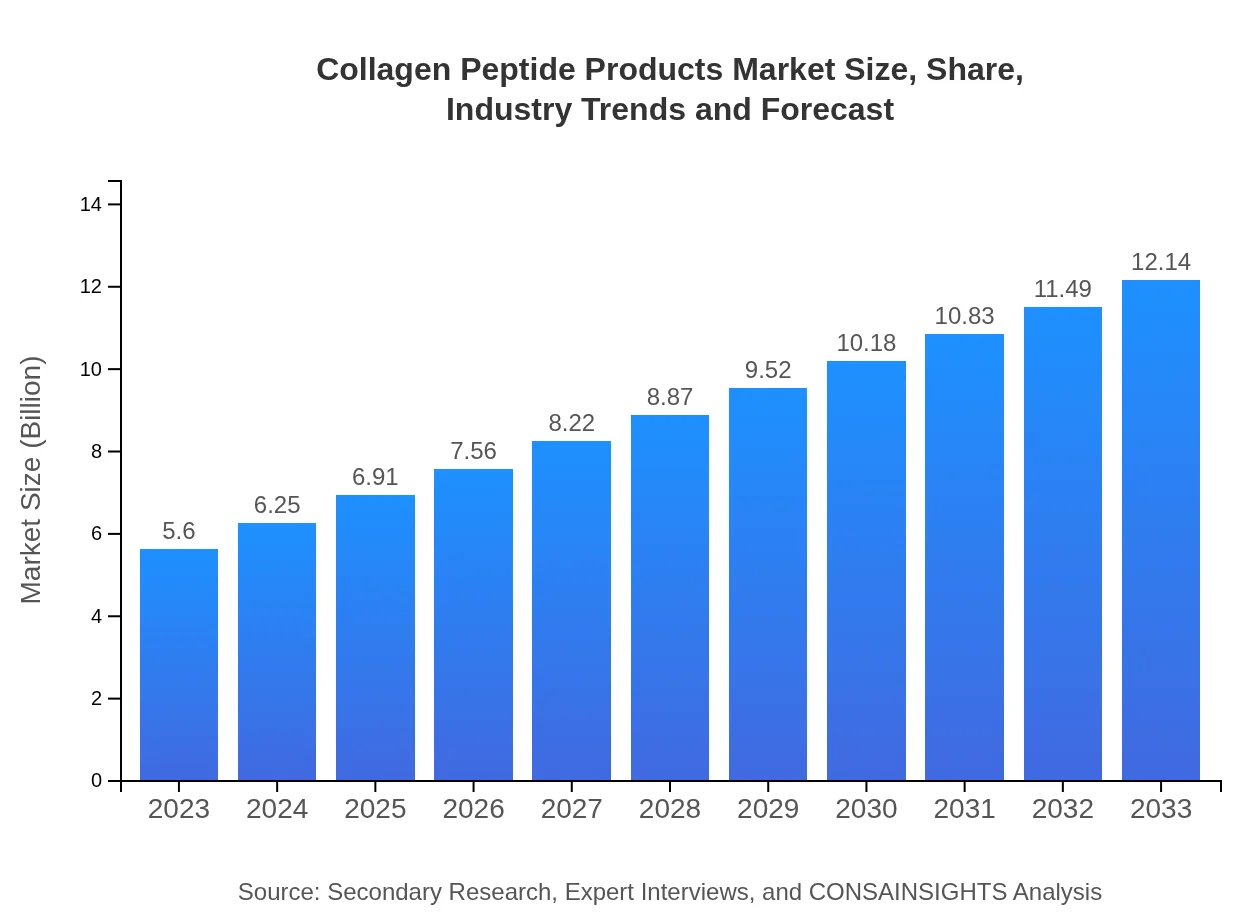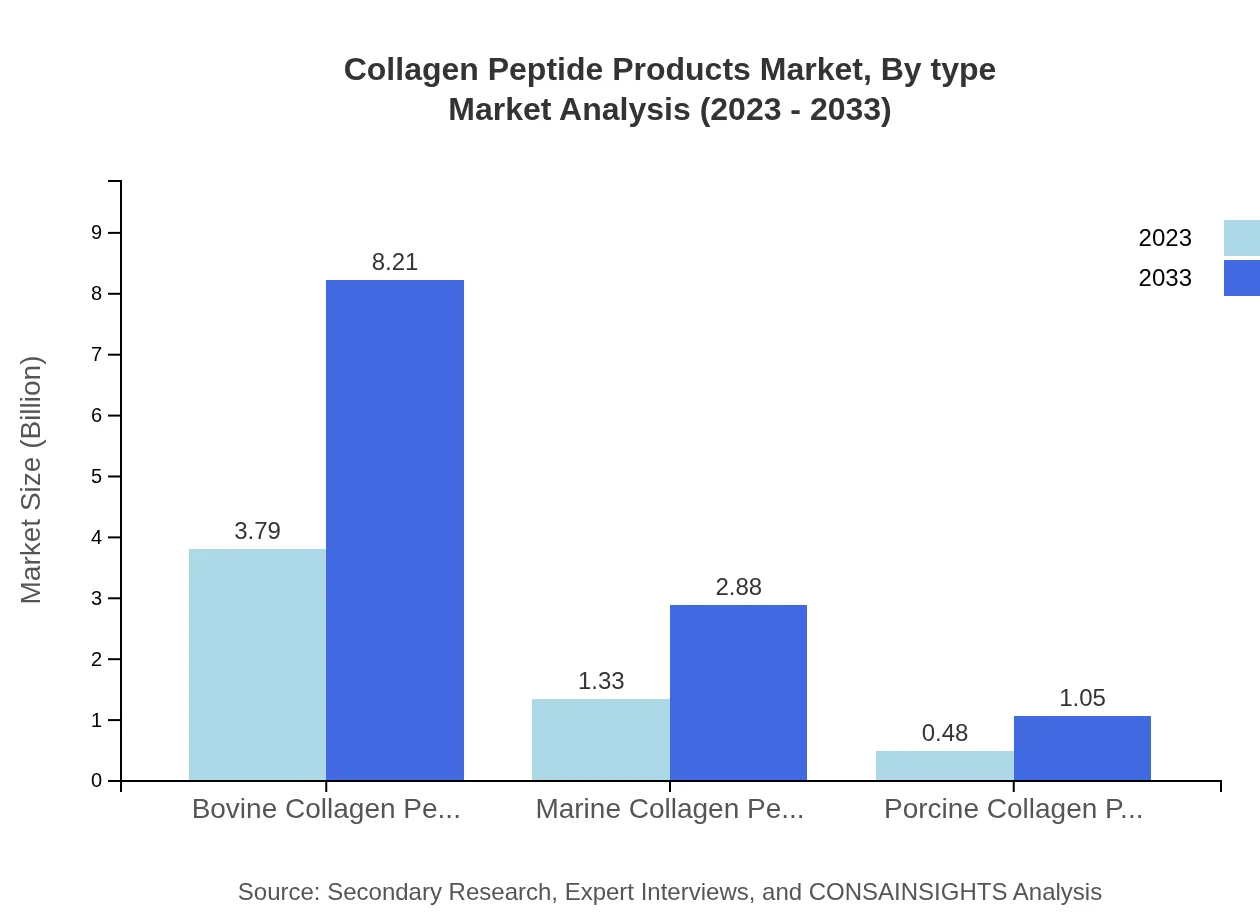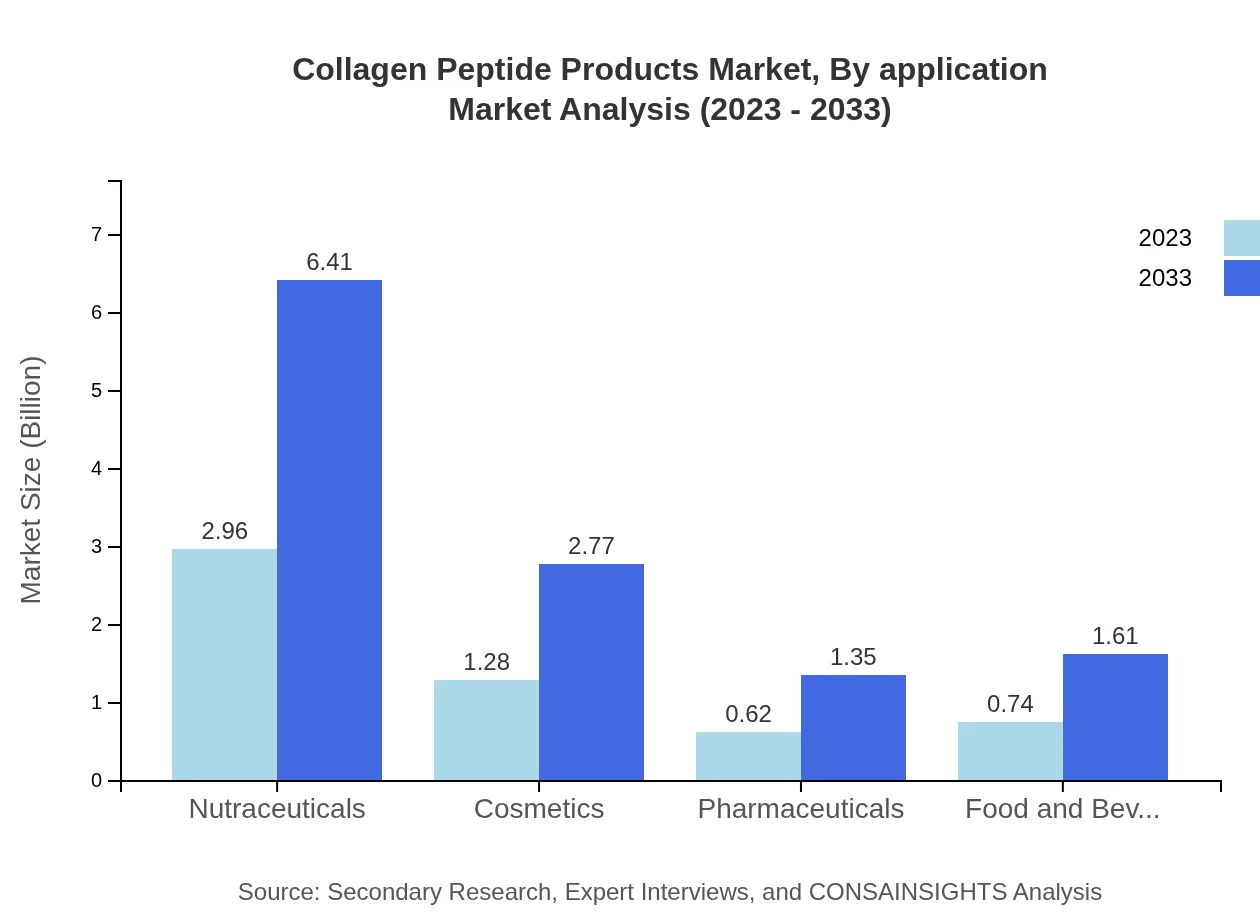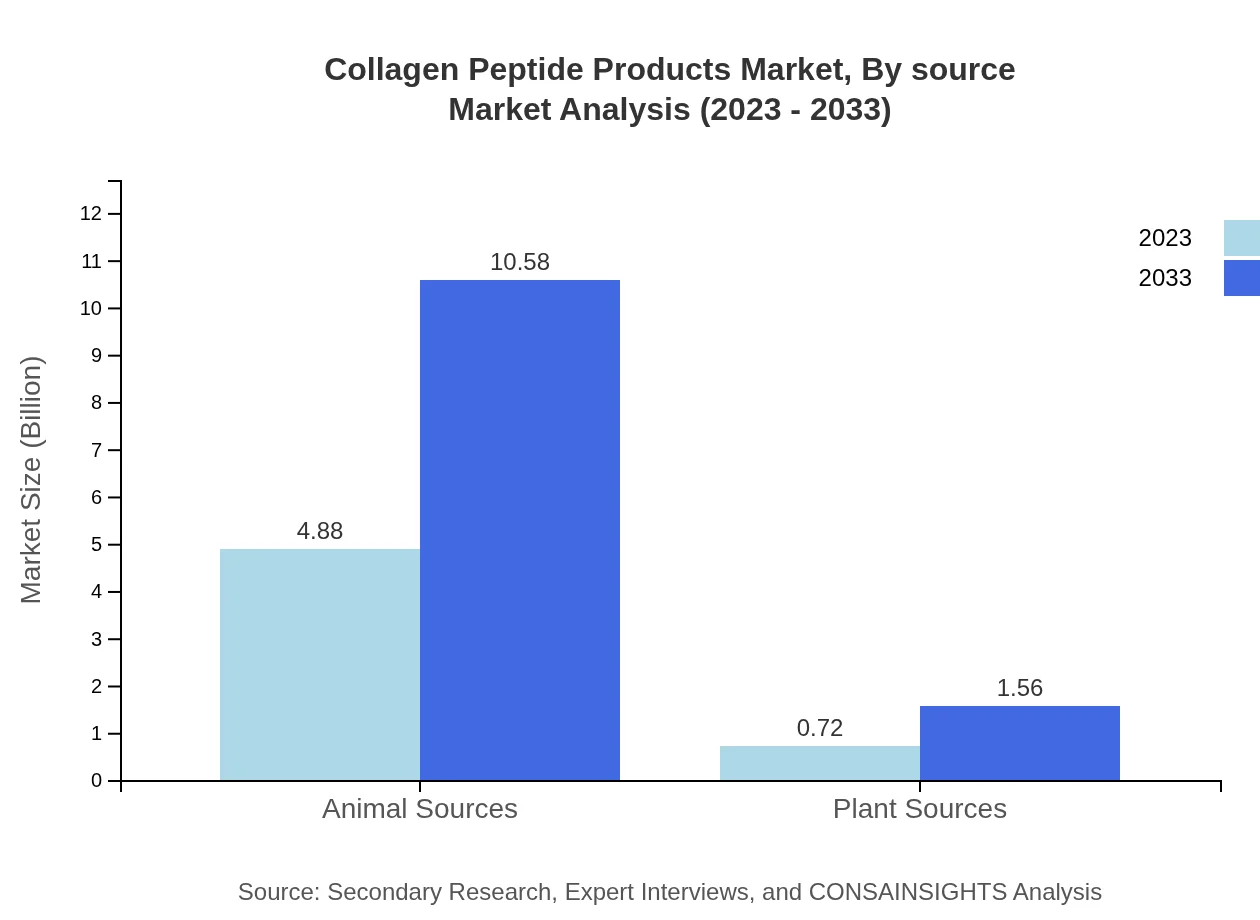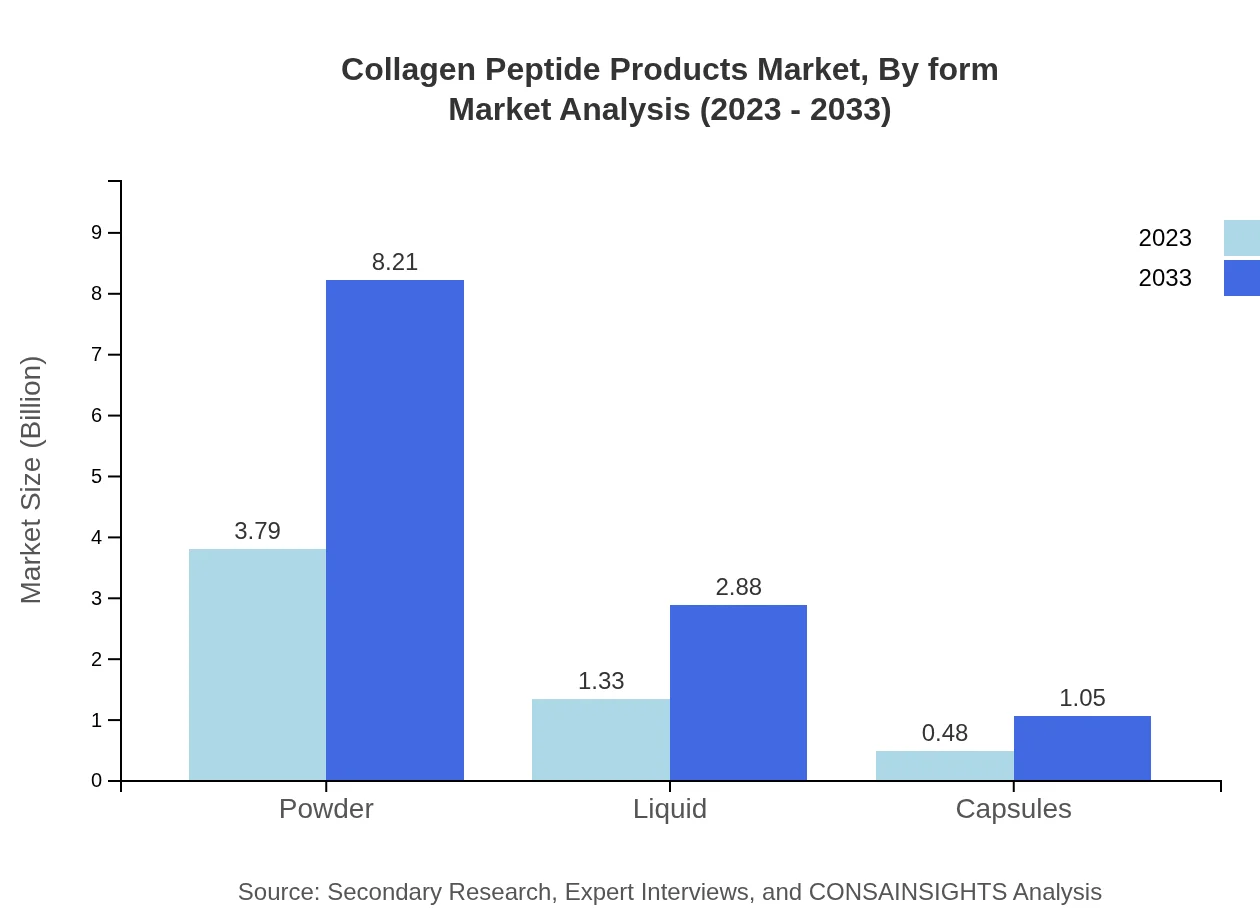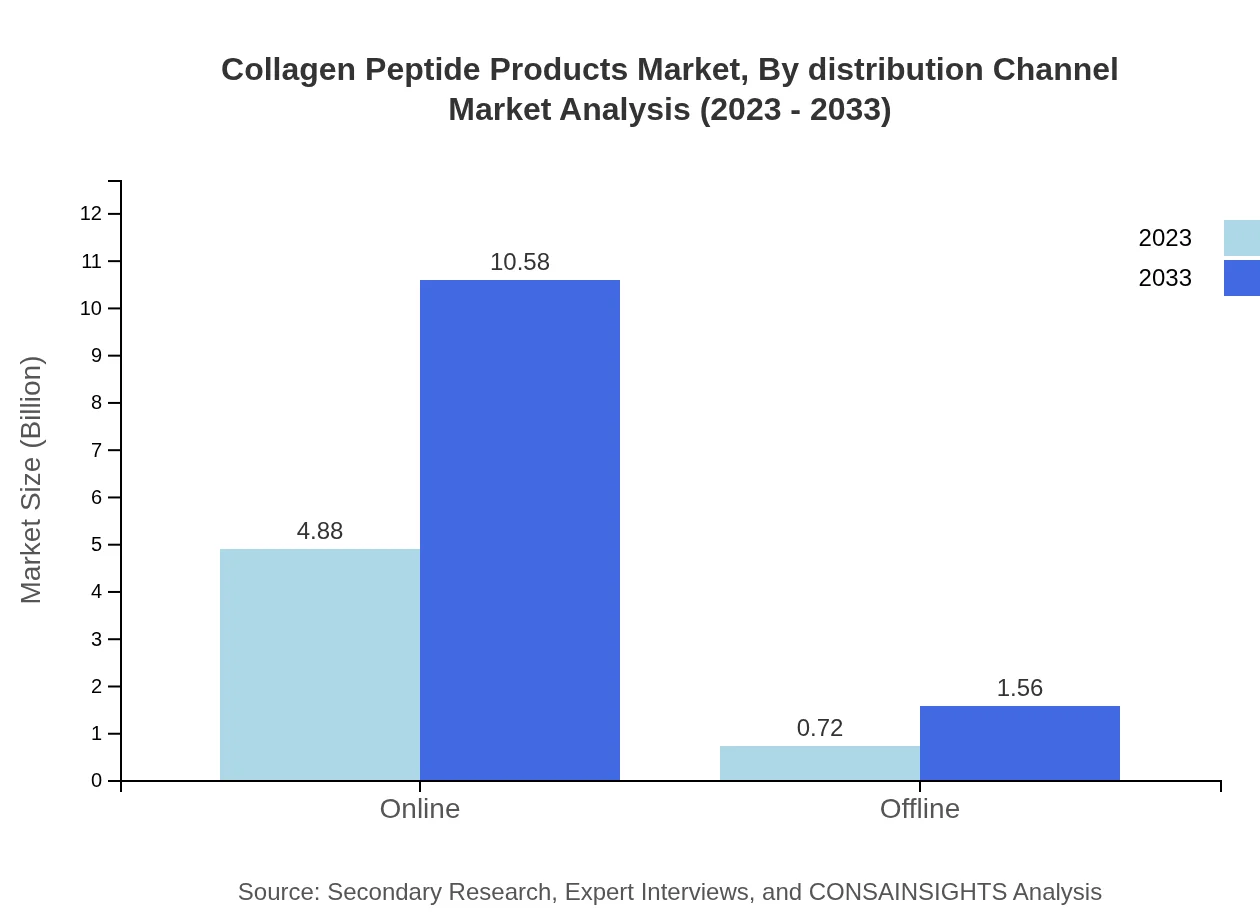Collagen Peptide Products Market Report
Published Date: 31 January 2026 | Report Code: collagen-peptide-products
Collagen Peptide Products Market Size, Share, Industry Trends and Forecast to 2033
This report provides an in-depth analysis of the Collagen Peptide Products market from 2023 to 2033, covering market trends, size, segments, regional insights, and forecast data for comprehensive business strategies.
| Metric | Value |
|---|---|
| Study Period | 2023 - 2033 |
| 2023 Market Size | $5.60 Billion |
| CAGR (2023-2033) | 7.8% |
| 2033 Market Size | $12.14 Billion |
| Top Companies | Gelita AG, Collagen Solutions PLC, Nitta Gelatin, Vital Proteins |
| Last Modified Date | 31 January 2026 |
Collagen Peptide Products Market Overview
Customize Collagen Peptide Products Market Report market research report
- ✔ Get in-depth analysis of Collagen Peptide Products market size, growth, and forecasts.
- ✔ Understand Collagen Peptide Products's regional dynamics and industry-specific trends.
- ✔ Identify potential applications, end-user demand, and growth segments in Collagen Peptide Products
What is the Market Size & CAGR of Collagen Peptide Products market in 2023?
Collagen Peptide Products Industry Analysis
Collagen Peptide Products Market Segmentation and Scope
Tell us your focus area and get a customized research report.
Collagen Peptide Products Market Analysis Report by Region
Europe Collagen Peptide Products Market Report:
The European market is estimated to grow from $1.67 billion in 2023 to $3.62 billion in 2033, with countries like Germany and France taking the lead. The rising demand for clean label products spurs growth, alongside a significant focus on sustainable sourcing and health-oriented products.Asia Pacific Collagen Peptide Products Market Report:
The Asia Pacific region is projected to see significant growth from $1.14 billion in 2023 to $2.48 billion in 2033, driven by rising disposable income and increasing health awareness. Countries like Japan, China, and India are focusing on integrative health trends, propelling demand for collagen peptides in dietary supplements and skin care products.North America Collagen Peptide Products Market Report:
North America leads the market with a valuation of $1.91 billion in 2023, anticipated to reach $4.15 billion by 2033. The region's market growth is fueled by high consumer spending on health and wellness supplements, advanced research in biological products, and the emergence of key market players focusing on innovative solutions.South America Collagen Peptide Products Market Report:
The South American market is expected to grow from $0.40 billion in 2023 to $0.88 billion in 2033. Factors such as a growing middle-class population and an increasing inclination towards health and wellness products beckon an upward shift in collagen peptide consumption in this region.Middle East & Africa Collagen Peptide Products Market Report:
In the Middle East and Africa, the market is projected to rise from $0.47 billion in 2023 to $1.01 billion in 2033. Increasing health awareness and dietary trends in urban regions are contributing to the market's expansion, along with the influence of western lifestyles.Tell us your focus area and get a customized research report.
Collagen Peptide Products Market Analysis By Type
In the Collagen Peptide Products market, types include Powder, Liquid, and Capsules. In 2023, powder products dominate the market with a size of $3.79 billion, maintaining a market share of 67.66%. Liquid forms are valued at $1.33 billion (23.7% share), while capsules account for $0.48 billion (8.64% share). Projections for 2033 indicate powder growth to $8.21 billion, liquid to $2.88 billion, and capsules to $1.05 billion.
Collagen Peptide Products Market Analysis By Application
The Collagen Peptide market applications include Nutraceuticals, Cosmetics, Pharmaceuticals, and Food & Beverage. Nutraceuticals hold the largest share at $2.96 billion (52.82%), followed by cosmetics at $1.28 billion (22.78%). Both sectors are expected to experience robust growth, with forecasts suggesting nutraceuticals expand to $6.41 billion and cosmetics to $2.77 billion by 2033.
Collagen Peptide Products Market Analysis By Source
The market sources comprise Animal Sources (bovine, marine, porcine) and Plant Sources. Animal sources dominate, valued at $4.88 billion (87.15%), expected to double to $10.58 billion by 2033. Plant sources, although smaller, are gaining traction, increasing from $0.72 billion (12.85%) to $1.56 billion as consumer preferences shift towards plant-based products.
Collagen Peptide Products Market Analysis By Form
Products are available in various forms, primarily powders, liquids, and capsules. Powders are the most popular form, expected to grow from $3.79 billion to $8.21 billion. Liquid forms are increasingly favored within health and cosmetic sectors, set to rise from $1.33 billion to $2.88 billion, while capsules, though smaller, will expand from $0.48 billion to $1.05 billion.
Collagen Peptide Products Market Analysis By Distribution Channel
The distribution channels include Online and Offline segments, with Online dominating the market at $4.88 billion (87.15%) in 2023. Expectations are that this will rise to $10.58 billion, reflecting ongoing trends towards digital shopping. Offline channels will also expand from $0.72 billion to $1.56 billion, with increased retailer participation.
Collagen Peptide Products Market Trends and Future Forecast
Tell us your focus area and get a customized research report.
Global Market Leaders and Top Companies in Collagen Peptide Products Industry
Gelita AG:
Gelita AG is a leading supplier of collagen-based products with a strong focus on innovation, providing high-quality collagen peptides for a variety of industries, including food, pharmaceuticals, and nutraceuticals.Collagen Solutions PLC:
Collagen Solutions PLC specializes in the manufacture of medical grade collagen products, catering to life sciences and cosmetic sectors, notably focusing on regenerative surgical solutions.Nitta Gelatin:
Nitta Gelatin is recognized for its diverse range of collagen products, with substantial market reach in the food and beverage industry, enhancing nutritional profiles.Vital Proteins:
Vital Proteins is a prominent name in the dietary supplement domain, promoting health benefits related to collagen, particularly in beauty and wellness.We're grateful to work with incredible clients.









FAQs
What is the market size of collagen Peptide Products?
The global collagen peptide products market is valued at approximately $5.6 billion in 2023, with a robust CAGR of 7.8% projected from 2023 to 2033, indicating significant growth opportunities in this sector.
What are the key market players or companies in the collagen Peptide Products industry?
Key players in the collagen peptide products market include prominent companies like Gelita AG, Johnson & Johnson, and Vital Proteins, which drive innovation and enhance product offerings to capture a larger market share globally.
What are the primary factors driving the growth in the collagen Peptide Products industry?
Growth in the collagen peptide market is driven by rising consumer demand for dietary supplements, increasing awareness of health benefits, and the growing application of collagen in cosmetics and pharmaceuticals.
Which region is the fastest Growing in the collagen Peptide Products?
The Asia Pacific region is witnessing rapid growth in the collagen peptide market, expected to rise from $1.14 billion in 2023 to $2.48 billion by 2033, fueled by rising health consciousness and demand for dietary supplements.
Does ConsaInsights provide customized market report data for the collagen Peptide Products industry?
Yes, ConsaInsights offers customized market report data tailored to specific requirements within the collagen peptide industry, ensuring comprehensive insights based on unique market dynamics and consumer behavior.
What deliverables can I expect from this collagen Peptide Products market research project?
Expect detailed reports on market trends, competitive analysis, segment data, consumer insights, and growth forecasts, providing actionable intelligence for strategic decision-making in the collagen peptide products market.
What are the market trends of collagen Peptide Products?
Current market trends include a shift towards plant-based collagen sources, rising interest in functional foods, and increased utilization in health supplements and beauty products, reflecting evolving consumer preferences.

